MSA Trust Members Magazine | Issue 67 | June 2023 Our MSA Community Speaks Out
Welcome to Issue 67
Hello and a warm welcome to your June edition of MSA News.
As ever, we are covering a wide range of topics relevant to life with MSA. These include sleep and MSA (we have recently launched a new factsheet on this subject), support available for bladder issues and information about accessible transport options.
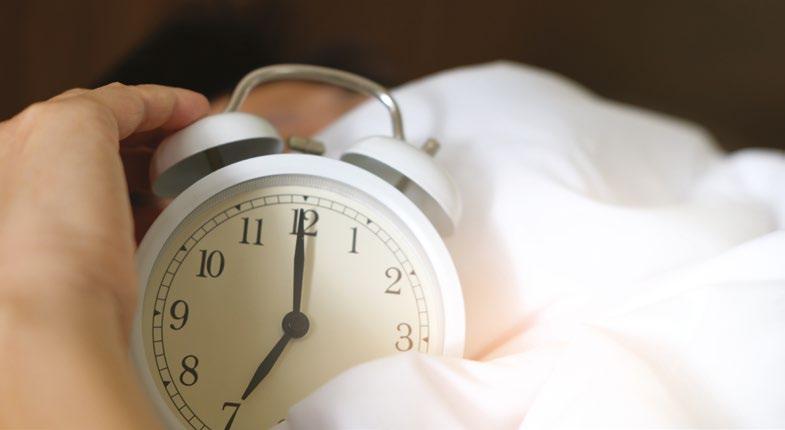
We also want to highlight page ten, where you will find a summary of the key findings from our second MSA Needs Survey. These results will be instrumental in ensuring our services continue to focus on our members’ needs and that we can continue to campaign on those issues most important to you. Thank you to everyone that took the time to complete the survey, we are very grateful.
On page six you will find an update on some exciting research news. Alongside this, on page 19, you can find out about our new Research Information Groups which will be launching in the Autumn.
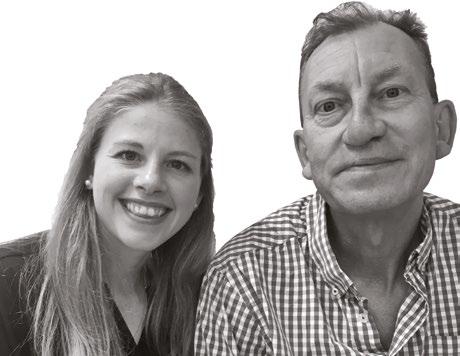
Finally, if you have made a donation to us (or want to do so) and are eligible, we would be grateful if you could complete the enclosed Gift Aid form and return it to us.

We hope you enjoy reading your MSA News magazine and please do contact us with any feedback you may have.
Emma and Andy
Registered Charity Number 1137652. Scottish Charity Number SC044635. Company Number 7302036 We endeavour to ensure the accuracy of articles in MSA News. Please note, however, that personal views and opinions expressed are not necessarily endorsed by the Trust. Designed by Base Media www.base-media.co.uk. Printed by INQ Design 020 7737 5775. CONTENTS 02 | msa news | Issue 67
GETTING A GOOD NIGHTS SLEEP - PAGE 4 News Roundup Getting a Good Night’s Sleep Research Update In Memory Our Support Services MSA Needs Survey Results Accessing Transport Fundraising Roundup Continence and MSA Supporting and Helping Each Other New Research Information Sessions 03 04 06 08 09 10 12 14 16 18 19 CHIEF EXECUTIVE OFFICER: Karen Walker MSA NEWS EDITORS: Emma Rushton Andy Barrick ALL ENQUIRIES TO OUR ADDRESS: Multiple System Atrophy Trust 51 St Olav’s Court City Business Centre, Lower Road London SE16 2XB Tel: 0333 323 4591 www.msatrust.org.uk
NEWS ROUNDUP
Sarah’s Wood Tree Planting
their knowledge of MSA and network with colleagues. The cost will be £40 and further information and details of the programme can be found here - www.msatrust. org.uk/event/2023-msa-trusthybrid-study-day-for-health-andcare-professionals. msa news
of these benefits they might be entitled to a higher rate under these new rules.
Our Social Welfare Specialist, Sam Fitzgerald, can offer information about claiming benefits and more details about Special Rules can be found here -

www.gov.uk/benefits-end-of-life
msa news
2023 MSA Candlelight

Late last year we held our annual tree planting event at Thoresby Estate. We had 100 members join us at Sarah’s Wood and we planted over 200 trees. It was a special day thinking about and remembering our loved ones and meeting other families affected by MSA.

We hope you will join us at our next planting on the 25th November to have a tree planted in your name or on behalf of a loved one. Help us create a lasting tribute that will continue to grow and flourish for years to come. You can sign up to attend herewww.msatrust.org.uk/tree msa news
MSA Study Day – 19th October 2023 - For Health and Care Professionals
We are excited to announce that our next MSA Study Day for Health and Care Professionals will be held in Sheffield. For the first time we will be running a hybrid event with both in-person and virtual options. With a broad variety of topics covered this is a great chance for professionals to further develop
Special Rules Benefits
TheGovernment has recently changed the timescales for claiming Special Rules benefits for people nearing the end of their lives. The 12-month end of life approach now used in the Special Rules means that the DWP is aligned with the NHS, where the definition of ‘end of life’ states that ‘patients are approaching the end of life when they are likely to die within the next 12 months’. If this is the case, then claims can be fast tracked for the following benefits.
• Personal Independence Payment (PIP)
• Universal Credit (UC)
• Employment and Support Allowance (ESA)
• Attendance Allowance (AA)
If people are already in receipt
Wewere so pleased to host our regular memorial event, MSA Candlelight, for the first time in Northern Ireland. Families from both the Republic of Ireland and Northern Ireland attended to remember loved ones, receive an update on MSA research from the Chair of our Scientific Advisory Panel (SAP), Dr Chris Kobylecki, and light remembrance candles. We are very grateful to the Cloughmore Male Voice Choir for their performances and our volunteers Rosemary and Ann for their support on the day. £3,550 was raised through the event and will be used to advance our efforts in MSA research. msa news
www.msatrust.org.uk | 03
NEWS ROUNDUP A SUMMARY OF THE LATEST MSA NEWS
Sleep and MSA
There can be several issues affecting sleep in MSA. Following member feedback we have written a new factsheet on the topic and here our MSA Nurse Specialist, Samantha Pavey, gives an overview for you.
Our new factsheet addresses Rapid Eye Movement (REM) sleep disorder, Sleep Apnoea, Stridor, Nocturia, Restless Leg Syndrome (RLS), Insomnia, Confusion, Daytime Sleepiness and Sleep Hygiene. Some of these are explained and covered briefly below. You can find the more detailed factsheet on our website but please let us know if you would like it posted to you.
In health, our sleep consists of five stages. These are outlined in the image to the right.

REM Sleep Behaviour Disorder (RBD)
REM sleep accounts for approximately 25% of our total night’s sleep, with most of it taking place during the second half of the night. Sleep cycles typically run in 90-minute patterns. RBD can manifest as small muscle twitches and quiet sleep talking to loud shouting, punching, kicking, grabbing a bed partner and jumping out of bed. People may dream about being chased or attacked and they can unknowingly enact the dream in real life.
Treatment may include muscle relaxant medication following a sleep study, which can be arranged by your Neurologist.
Restless Leg Syndrome (RLS) causes unpleasant or uncomfortable sensations in the legs and an irresistible urge to move them. It is caused by low iron levels or low dopamine levels.
The sensations may be described as aching, throbbing, pulling, itching, crawling or creeping.
Treatments may include Parkinson’s medication (dopamine agonists) such as Ropinirole or Pramipexole.
The following measures may also help relieve your symptoms:
• Massaging your legs
• Taking a hot bath in the evening
• Applying a hot or cold compress to your leg muscles
• Doing activities that distract your mind such as reading or watching television
• Relaxation exercise such as yoga or tai chi
• Taking magnesium supplements or using magnesium spray to leg muscles
• Walking and stretching
• Lifestyle changes can also help including cutting down on alcohol and caffeine and treating anaemia.
Sleep Apnoea
Sleep apnoea is the involuntary stopping (and restarting) of breathing while someone is asleep.
People with sleep apnoea may experience some of the following:
• Extremely loud heavy snoring, often interrupted by pauses and gasps
• Excessive daytime sleepiness, e.g. falling asleep at work, whilst
GETTING A GOOD NIGHTS REST
SYMPTOMS
04 | msa news | Issue 67
driving, during conversation or when watching TV
• Irritability, short temper
• Morning headaches
• Forgetfulness
• Changes in mood or behaviour
Stridor
Stridor is an abnormal highpitched sound made when breathing in. It may be harsh, musical or breathy. Stridor is usually caused by a blockage or narrowing in the upper airway. In MSA, stridor may occur as a result of the vocal cords not functioning normally, rather than an obstruction. An Ear Nose and Throat surgeon can assess the vocal cords and suggest treatments.
Steps to Sleeping Better - Sleep Hygiene
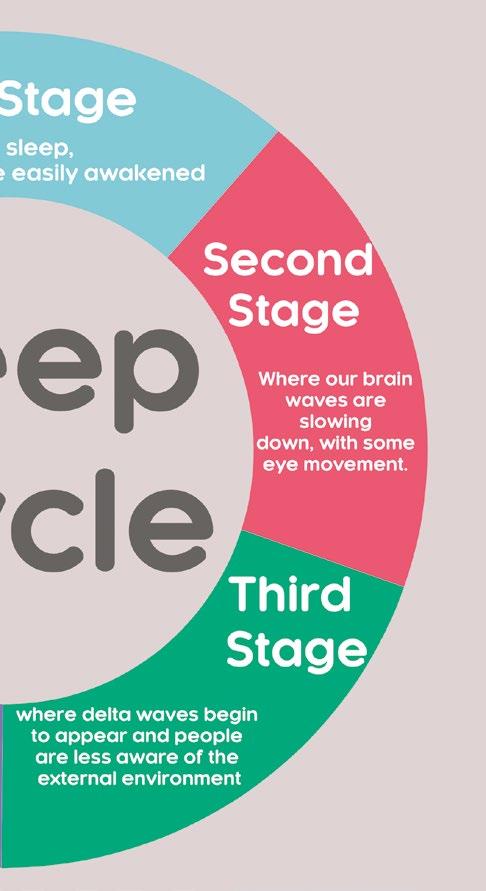
In some cases, maintaining good sleep and wake habits can improve sleep issues without the need for medications. Here are some ideas to try:
Try to set and follow regular bed/sleep and wake times with a goal of spending at least seven, but not much more than eight, hours in bed each night. Bedtimes should be chosen based on a target waking time (e.g. don’t go to bed at 8pm if you don’t want to be up at 4am!).
• Anxiety or depression
• Decreased interest in sex.
Diagnosis and treatments are covered in our factsheet, but a Continuous Positive Airway Pressure (CPAP) machine, which gently pumps air into a mask you wear over your mouth or nose while you sleep, is the most common treatment.
The bed should be used only as a place for sleeping or sex. Reading, using a computer and watching television should be done elsewhere.
Daytime napping should be limited to one nap of approximately 30 minutes. Longer naps don’t provide any greater benefit for daytime fatigue and can disrupt sleep for the coming night.
Try to expose yourself to as much daylight, physical and mental stimulation during the day as possible. Light is an important synchroniser of the sleepwake cycle.
As physical and mental activity stimulates the alerting and wakefulness centres in the brain and increases blood and oxygen flow, avoid physical and mental exertion in the evening to prepare the body for sleep.
Complementary therapies can aid restful sleep. Reflexology and Aromatherapy massage can be beneficial (see our Complementary Therapies factsheet).
If you are having any of the issues mentioned in this article do talk to your Specialist, Parkinson’s Disease Nurse Specialist or one of our MSA Health Care Specialists. msa news
www.msatrust.org.uk | 05 SYMPTOMS GETTING A GOOD NIGHTS REST
1.
2.
3.
4.
5.
New Biomarker for MSA
A study, led by Dr Viorica Chelban, has shown for the first time that a biomarker from a blood test can accurately measure disease progression and response to potential treatments in people with MSA.

a test that can be easily quantified (turned into a number). The lack of objective measures in MSA has been a barrier to designing clinical trials. The development of an objective measure will make future trials into treatments for MSA more reliable and attractive to research organisations.
What biomarker was used?
A central and irreversible feature in many neurodegenerative disorders, including MSA, is damage to the nerve cells which results in the release of neurofilament light chain (NfL). NfL is a protein that is released when cell damage has occurred.
MSA is caused by the death of brain cells in areas of the brain that control movement and coordination, breathing, swallowing and blood pressure. The cause of MSA is not fully understood, but we know that the accumulation of an abnormal protein called alphasynuclein is seen in MSA.
Why is a biomarker needed?
Clinical trials of potential treatments for MSA currently rely on data that is gathered from individual physical assessments reported by doctors, and symptoms or benefits reported by patients. These measurements are ‘subjective’ because they are reported by an individual person. An objective measurement is one that isn’t measured by an individual but is measured by
Samples for NfL biomarker have traditionally been taken from the fluid that surrounds the brain and spinal cord (cerebrospinal fluid - CSF) which must be extracted using an invasive procedure called lumbar puncture. Lumbar puncture is time-consuming, can be uncomfortable and is not easily accessible or widely available.
This study was particularly interested in assessing the reliability of a blood biomarker, which would provide a more accessible and comfortable experience for people with MSA. It found that NfL can be detected in blood even at low levels and that concentrations of NfL in the blood were higher in people with MSA compared to ‘healthy’ controls. Blood NfL correlated very well with
06 | msa news | Issue 67
RESEARCH THE LATEST RESEARCH NEWS
the CSF NfL, showing that a simple blood test was as reliable as lumbar puncture. This cheaper, less invasive and more accessible way of measuring NfL is an effective objective measurement that can be used in clinical trials in MSA. The study also showed that NfL can track MSA disease severity and can be correlated to what is seen on brain scans.
Numbers needed for research
The project recruited one of the largest MSA cohorts ever assembled for biomarkers. The cohort included 212 patients with MSA, plus 40 age-matched healthy controls recruited from the UK, France, Spain and Germany.
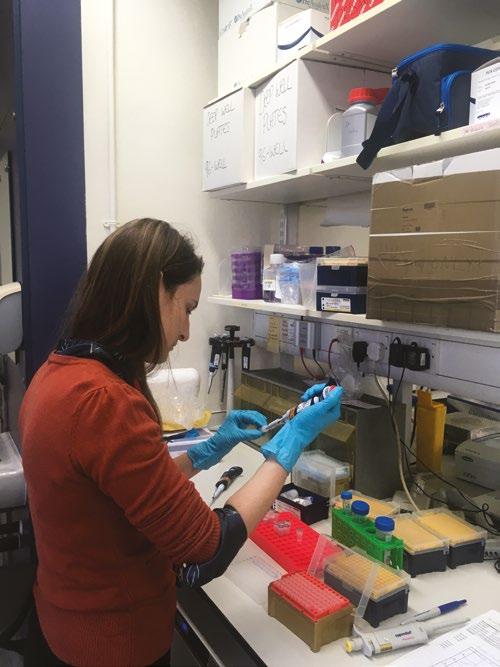
A further key question that the team wanted to answer was whether finding an objective biomarker could reduce the number of people needed to participate in a clinical trial. They were able to estimate that a trial that previously may have needed 258 people with MSA could now show the same results with only 28 participants, when using the NfL blood test as an outcome measure. This will make clinical trials smaller and quicker, without reducing reliability.
Dr Viorica Chelban (UCL) said
“For the first time we have shown that in MSA this biomarker can be used to measure the effects of drugs and their ability to stop, or slow-down, the nerve cell death in MSA, with excellent accuracy. Although NfL is not specific to any disease, it can help reduce the number of MSA patients needed for trials. We estimated that a trial with 28 participants would be able to detect a 30% reduction in annual NfL level at 80% power. Before we had validated the NfL for MSA trials, using clinical scores alone, 258 patients were needed for the same size of effect. This is a significant reduction in numbers, and a particularly significant finding in a rare disease like MSA.”
Professor Henry Houlden (UCL) added
“NfL protein has been explored as a reliable biomarker in several neurodegenerative disorders but data in MSA has been limited. Therefore, NfL was not routinely used as an outcome measure in MSA until now. In this large
and well-characterised MSA cohort we found that NfL correlates well with disease severity particularly in the earlier stages of disease. Having a blood test that allows us to monitor the disease, as an alternative to a lumbar puncture, is very helpful.”
The study was funded by Manx MSA and the MSA Trust and published in the journal ‘Brain’ - www.academic.oup.com/brain/ article/145/12/4398/6651446 msa news
MSA Research Symposium
A MSA Research Symposium was held in January in London and was a great success. Over 70 delegates gathered to hear about latest research in MSA and to have the opportunity to network and collaborate with colleagues. The symposium sessions have been summarised on the MSA Trust blog, available here - www.msatrust.org.uk/blog
www.msatrust.org.uk | 07 RESEARCH THE LATEST RESEARCH NEWS
Robert Thompson
Ann Wathan
Steve Hitchman
Edward Cooper
Harshlata Raval
Nick Bate
Laurence Lester
David March
Alan Fairlie
Christopher Daniel
John Lindley
Martin McGrath
Gordon Slinn
In Memory
Gilbert Dunn
David Clish
David Yeadon
Michael McDonald
Stephen Hyam
Bruce Powell
Robert Walker
Mary Sole
Chris Sutton
Susan Byrne
Dennis Hoey
Eric Jones
John Moffa
Andrea Huckstep
Steven Tomlin
Caroline Connors
Sue Johnston
Stuart Clegg
Helen Elliott
Patricia Okeeffe
Keith Spratt
James Hindes
Frank Moore
Susan Williams
Nirupa Doshi
David Taylor
Barry Toshner
Heather Williams
Elaine Seymour
David Appleton
Lilian Bottoms
Derek Elliott
Darren Haley
Daniel De Blacam
Roderick McLean
James McMullan
Keith Tomlin
Phillipa Milner
Malcolm Guest
Remembering your Loved Ones
Manypeople choose to have a further Celebration of Life event after a funeral service. This takes the form of a non-religious remembrance event that brings family and friends together to celebrate the life of a loved one.
It can be as simple as coming together to light candles or start a remembrance garden. It could also be a bigger event such as a musical concert, organised by students and teachers, to celebrate the life of a special teacher who has recently passed away.
Fundraising can play an essential part in the day and is a positive way of commemorating someone’s life while ensuring our continued support for those still living with MSA.
For those wishing to donate to the Trust in memory of a loved one, we can send collection boxes and donation envelopes to maximise the support on the day. Email fundraising@msatrust.org.uk to request these materials.
To organise an online collection, you can open a Much-Loved tribute page and include the event details. Visit www.msatrust.muchloved.org to get started.
If you would like any support with events please contact our fundraising team on the email address above or call 0333 323 4591. msa news

REMEMBERING THOSE WHO WE HAVE LOVED AND LOST
IN MEMORIAM 08 | msa news | Issue 67
What can the MSA Trust offer you?

Office Phone and Email Service
We are here from Monday to Friday to answer your questions or queries and point you in the right direction for further help and assistance.
Our MSA Health Care Specialists
Our MSA Health Care Specialists can be contacted Monday to Friday providing support via email and telephone. They are happy to discuss all your concerns and answer any medical questions you may have.
Health Care Specialist Attendance at Clinics
Our MSA Health Care Specialists attend specialist clinics around the UK and Ireland, offering information and assistance to people with MSA.
Social Welfare Specialist
Our Social Welfare Specialist offers support with benefit checks, care services, equipment and adaptations, grants, Continuing Health Care and information about support for Carers.
MSA Information Resources
Our MSA specific factsheets, guides and information materials on a variety of topics are all easily accessible on our website. They cover a wide range of topics, both health and non-health related.
Information Webinars
We currently have three webinars on our website: An Introduction to MSA – designed for newly diagnosed members and their families. Managing Blood Pressure in MSA – a webinar about how blood pressure is impacted in MSA.
Palliative Care and MSA – Looking at planning ahead and making your wishes known.
Digital and In-person Support Groups
We hold regional online and in-person Support Groups throughout the UK and Ireland. All members who have chosen to receive invitations to Support Groups will be contacted at regular intervals with details of meetings being held in their area. We also hold a regular digital ‘coffee morning’ for informal chats as well as our Carer’s only digital Support Group.
Voice Banking and Communication Aids
The Trust will fund voice banking for fully registered members. We also supply voice amplifiers and lightwriters (subject to availability) on long-term loan to our members, as well as a small number of Predictable Apps for use on handheld Apple devices.
HealthUnlocked Forum
There is a dedicated online MSA community on the HealthUnlocked Forum. The site enables peer support and the opportunity to actively engage with people going through similar experiences to youwww.healthunlocked.com/msa-trust.
Health Care Professional Education
The Trust provides MSA education and training sessions for health and social care professionals, led by our MSA Health Care Specialists. msa news
Trust Office: 0333 323 4591
E-mail: support@msatrust.org.uk
Website: www.msatrust.org.uk
www.msatrust.org.uk | 09 SUPPORT FOR YOU OUR SUPPORT SERVICES
We understand that receiving an MSA diagnosis may feel overwhelming, so we are here to help you get the best support for yourself and your family. Our services are free of charge to all registered members who are affected by MSA.
Listening to You
The Trust has recently conducted its second MSA Needs Survey looking at the needs and experiences of people affected by MSA.
To capture as many responses and experiences as possible we used three separate questionnaires - for people living with MSA, for carers and for people who had previously cared for a loved one with MSA.
Below are the headline results from the survey, showing our main findings:
73% of respondent s stated that MSA impact s severely on their quality of life.
86% of respondents rated the information provided by the MSA Trust as good or excellent.
89% of carers experience fatigue and tiredness.
44% of respondents felt help for their physical needs was poor or very poor.
Over 70%
of people with MSA reported feeling depressed or anxious. But
63%
of respondents rated their emotional help for this as poor or very poor.
10 | msa news | Issue 67
NEWS ROUNDUP MSA NEEDS SURVEYS
of respondents had discussed end-of-life care options with a health care professional.
Of those who had this discussion,
38% over 81% found the conversation helpful.
49% of people living with MSA said it took between two to four years after experiencing symptoms to get their diagnosis. Some reported even longer.
56% of people with MSA responded that they thought their GP and practice did not understand MSA.
10
Only 1 in had been offered social work help despite MSA impacting severely on quality of life, with 66% of people needing help with at least half of daily activities.
The results of the MSA Needs Survey will directly influence the Trusts organisational strategy for the next four years. This will include service development, new project work and using evidence for policy work in the wider charity and health and social care sectors.
20% of carers reported that their needs were considered at clinic appointments, despite their role being so vital.
82% of people living with MSA felt the MSA Nurse Specialists provide them with valuable support.
The full technical report and full summary for this research is available on our website – www.msatrust.org.uk/msa-needssurveys-2022
www.msatrust.org.uk | 11
NEWS ROUNDUP MSA NEEDS SURVEYS
Accessing Transport
The Motability Scheme
The Motability Scheme allows you to exchange your mobility allowance for a new car, wheelchair accessible vehicle (WAV), mobility scooter or powered wheelchair. To be eligible you must be in receipt of the enhanced rate mobility component of Personal Independence Payment (PIP), Disability Living Allowance (DLA) or Adult Disability Payment (ADP). Unfortunately, the Motability Scheme is not available to those in receipt of Attendance Allowance.
Motability can adapt the vehicle to suit your specific needs. All leases include insurance, car tax, servicing and MOT, as well as breakdown cover. For more information visit: www.motability.co.uk
Blue Badge
If you’re in receipt of the mobility component of PIP, DLA or ADP you may automatically qualify for a Blue Badge depending on the number of points awarded for each of the two mobility questions. If you’re not in receipt of a qualifying benefit, you can apply for a Blue Badge assessment through your local council. For more information visit: www.gov.uk/apply-blue-badge
VAT Relief
HM Revenue & Customs allows VAT relief on adapted motor vehicles for disabled people (VAT Notice 1002).
You should not be charged VAT if one of the following applies:
• If you need to adapt your current vehicle to meet your needs, the adaptions should be zero-rated for VAT
• If you’re a wheelchair user buying a vehicle which has been ‘substantially and permanently’ adapted to meet your needs, the cost of the vehicle should be zero-rated
• If you’re purchasing a new vehicle that has minor adaptations, only the adaptations will be zerorated, you still pay VAT on the cost of the vehicle itself.
You will need to complete a customer declaration (HMRC Form 1615A), which you should be able to obtain from the vehicle supplier or you can download a copy here:

www.gov.uk/government/publications/ customer-declaration-for-zero-rated-vatsupply-of-an-adapted-motor-vehiclevat1615a.
Any repair or maintenance of an adapted vehicle can also be zero-rated for VAT when the work relates to a vehicle (or an adaptation to a vehicle) that was eligible for zero rating when it was purchased or supplied. You will need your original invoice to show the vehicle or adaptation was zerorated when supplied.
SUPPORT
YOU VENTURING
ABOUT
FOR
OUT AND
With the weather finally starting to improve, many of us are wanting to venture out more. For those living with MSA accessible transport can be vital. Here, Sam Fitzgerald, our Social Welfare Specialist, explains some of the options and support available.
12 | msa news | Issue 67
Transport Schemes
Check locally to see what additional transport schemes or concessions may be available, for instance:

• The Disabled Person’s Freedom Pass and the Taxicard Scheme for London residentswww.londoncouncils.gov.uk
• The Dial-A-Ride Scheme is available in many areas of the UK for those who find it difficult to access public transport and require door-to-door service. Check with your local council to see if Dial-A-Ride is available in your area.
• Royal Voluntary Service offers community and patient transport. You can check the availability of transport services in your area by visiting www.royalvoluntaryservice.org. uk/our-services/getting-out-about
• Age UK offers door-to-door transport for older people in some areas of the country. To check if your local Age UK can help visit www.ageuk.org.uk/services/in-your-area/ transport
Public Transport By Bus
The law states that bus drivers must give reasonable assistance to disabled passengers and with more low floor buses being introduced, accessing bus services is becoming easier. In England, Scotland and Wales you may be entitled to a Disabled Person’s Bus Pass for free travel; whilst in Northern Ireland you may get either free or concessionary travel depending on your age and circumstance. For more information visit www.gov.uk/apply-for-disabled-bus-pass
The Republic of Ireland offers a Free Travel Scheme which is available to anyone who is aged 66 or over. If you are under 66 you may still be eligible if you’re in receipt of a qualifying benefit. For more information visit www.gov. ie/en/service/9bba61-free-travel-scheme.
Public Transport By Rail
When travelling by train you can request Passenger Assist up to two hours before your journey time for help when you arrive at the station, getting on and off the train and whilst onboard. You can book Passenger Assist online at www.passengerassistance.com or by calling 0800 0223 720. You can save a third on train fares with a Disabled Persons Railcard, although there is an annual fee. To check your eligibility visit: www.disabledpersons-railcard.co.uk.
Public Transport By Air
If you require assistance at the airport, for instance at check in, getting on and off the plane or whilst onboard, you should notify the airline at least 48 hours before departure. Each airport and airline offer different facilities, however in the UK and EU there are rules regarding the minimum level of assistance which should be available. For more information visit: www.gov.uk/transport-disabled/planes You can travel with up to two items of mobility equipment free of charge – this should not count as part of your baggage allowance.
SUPPORT FOR YOU VENTURING OUT AND ABOUT Contact Sam on 0333 323 4591 or at support@msatrust.org.uk for additional information and support. Please note that some of the information here is for the UK only. Check out the ‘I Wish I’d Known That a Year Ago’ factsheet for your country via our website, for specific guidance. www.msatrust.org.uk | 13
Running for a Cause
Inspiring stories from our London Marathon Fundraisers





The London Marathon is an event that captures the hearts and minds of people from all walks of life. Every year thousands of runners take to the streets to raise money for charity. This year was no exception, and we would like to thank our 11 runners - Nicki, Sam G, Sam P, Harry, Kev, Tom, Lindsay, Amy, Katie, Malcolm and Charlene. Together they raised upwards of £22,000 for the Trust through their brilliant determination and grit.
“A close family member was diagnosed with MSA so I wanted to do something to support the Trust. The day was incredible - strangers cheering and the Trust being out in force on the day itself, with cheer stations and meeting us at the finish line. It’s something I’ll remember for a long time.” Sam G
“When the opportunity came to run for MSAT, I couldn’t really say no! That was the start of a 6-month training programme, late nights and exhausting weekends. I felt overwhelmed on a number of occasions, However, I will forever feel proud of myself for finishing it.” Lindsay
We would like to congratulate and thank each of our fantastic runners. Finishing a Marathon is no easy feat and we are so proud to celebrate their achievement. msa news
“My mother-in-law, Trina Maltby, has MSA and as a family we wanted to raise awareness for the Trust. The MSAT cheer stations along the route were a complete morale boost! The atmosphere was amazing. I feel proud to have run the London Marathon and even more so for such a fantastic charity that is so close to mine and my family’s hearts.” Tom

FUNDRAISING STARS A ROUND UP OF YOUR LATEST FUNDRAISING STORIES
14 | msa news | Issue 67
All aboard for MSA Trust Fundraising – how everyone can get involved
Ifyou, or a loved one, are living with MSA, getting involved with fundraising at the Trust can be a fantastic way to connect with family and friends whilst also raising vital funds and awareness. Here are just a few ideas to consider:
1) Virtual fundraising events: Consider hosting a virtual event such as a virtual walk, virtual bingo or a trivia night. These types of events can be done from the comfort of your own home and can be a great way to engage with others.
2) Arts and crafts: Why not learn a new skill with your family or friends or use your existing artistic talents to create items that can be sold to raise funds.

3) Milk Sugar And Tea Party: Invite everyone round for a MSAT party whether it’s cake and tea or beer and BBQ in the garden, this can be a fun and tasty way to socialise.
Elizabeth Franklin organised her own coffee morning in support of her partner David Franklin who is living with MSA. “Although it was a lot of work, I thoroughly enjoyed it and felt very well supported by family, friends and ex-colleagues. David enjoyed a few minutes at a time with visitors and our grandson Finley kept him company. The grand total came to £663”.
4) Social media campaigns: using social media can be a great way to stay connected with friends and family and to raise funds for the Trust. You could create a crowdfunding campaign or start a Facebook fundraiser.
Jackie was diagnosed with MSA-C in July 2022 and was struggling with knowing how to tell her friends the difficult news. She decided to get involved with a Trust walking challenge, ‘Miles for MSATrust’ to help announce her recent diagnosis.

“I used an online fundraising platform to tell everyone in one go, rather than lots of repetitive, exhausting phone calls - my family and friends were incredibly supportive. I’ve enjoyed the challenge and writing regular updates on my page to keep everyone updated. I am looking forward to seeing what else I can participate in to raise funds to support the Trust as I am making it my mission to raise as much awareness of MSA as possible” Jackie walked the equivalent of a Marathon over the course of a month and raised an incredible £1,269! msa news
Whether you’re living with MSA yourself or supporting a loved one, organising a fundraiser can be an effective way to connect with your community. For more information please contact a member of our team at fundraising@msatrust.org.uk.
FUNDRAISING STARS A ROUND UP OF YOUR LASTEST FUNDRAISING STORIES www.msatrust.org.uk | 15
Those living with MSA often experience social isolation and loneliness as very few people, including health care professionals, have heard of MSA. Symptoms are progressive and complex, which we understand can make it challenging to take part in social activities and events.
CRAFTS
AND COFFEE MORNING
Just Can’t Wait
Bladder problems are common in MSA and can be one of the first symptoms people experience. Our MSA Nurse Specialist, Emma Saunders, looks at how bladder issues affect people with MSA and things that may help.
How the bladder works
Urine is produced in the kidneys and passes into the bladder, where it is stored. When urine builds up the bladder sends nerve signals to the spinal cord and brain. The brain then sends messages down the spinal cord to relax the sphincter (the valve which opens the bladder) to
contract the bladder wall muscle (the detrusor) so that urine is passed from the urethra out of the body.
This is a complex process and needs the bladder, the brain and all the nerves between them to be working in co-ordination. In MSA, the messages between brain and bladder are affected and this causes urinary symptoms of:
• Urgency - needing to go to the toilet suddenly and quickly

• Frequency - going to the toilet a lot but only passing small amounts of urine
• Double voiding - needing to pass urine again very soon because the bladder did not completely empty the first time
16 | msa news | Issue 67 SYMPTOMS SUPPORT WITH BLADDER DIFFICULTIES
• Nocturia - going to toilet more than once overnight
• Urine infections – can make people feel very unwell and can make other symptoms of MSA worse. The early use of antibiotics to treat urine infections is very important
• Constipation - A bowel full of solid stool causes pressure on the bladder that will increase the problems of poor bladder function.
Investigations
Different bladder issues have different causes, so you may need to have some tests to find the cause and therefore the best treatment for your symptoms.
You may be asked about your general health or to keep a diary regarding how much you drink, the colour and smell of your urine and your bladder problems. A sample of urine may be needed to test for infection.
An ultrasound scan may be completed to measure if any urine is left in the bladder after you have been to the toilet (called a post-void residual or PVR scan).
If more detailed testing is needed you may be referred for urodynamics - a range of procedures that test how well your bladder fills and empties.
Who can help?
GPs, District Nurses and Community Matrons can give advice on continence issues and your GP or Neurologist can refer to Urology or Continence teams, who are experts in assessing, diagnosing and managing urinary problems.
Support
• Maintaining a healthy diet, fluid
intake and toilet habits can help with preventing problems and managing symptoms
• Aim to drink 1.5-2 litres of fluid a day – this is about eight large glasses of water. Drinking too little can result in urine being concentrated perhaps irritating your bladder and causing infections
• Be comfortable and wellsupported on the toilet. Some people find bending forward and gently pressing or slow firm tapping over the bladder at the end of the flow helps to squeeze out any urine left in the bladder
• Choose clothes that are easy to undo or take off.
Treatment
There are several medications available to reduce the symptoms of urgency and frequency. DDAVP (desmopressin) is a hormone taken at night to help reduce nocturia. Botox injections into the bladder can be helpful for some people. Regular or daily laxatives may be required if constipation is contributing to bladder problems.
Equipment
Advice from an Occupational Therapist can help to make it easier to use your toilet. Adjusting the height of the toilet, adding grab rails
or creating a downstairs toilet may be useful. Urinals or commodes can help if it is unsafe or too difficult to get to the toilet. Continence pads are available with varying absorbency suitable for day or night. For men, urinary sheaths fit over the penis like a condom and attach to a urine collection bag via a tube. These are not usually used for the whole day, as they can cause skin irritation, but they can be useful when out and about or overnight.
Catheters are thin plastic tubes that are passed into the bladder to drain it and can help to fully empty the bladder, or when getting to the toilet is too difficult. Catheters can either be ‘intermittent’ or ‘indwelling’. Intermittent catheters are inserted into the urethra to reach the bladder, the urine is drained and then the catheter is removed as often as needed throughout the day. Intermittent catheterisation is a very useful means of improving bladder control if incomplete emptying is a significant problem.
If a catheter is needed and using an intermittent catheter is not manageable then an indwelling catheter can be used. These catheters are inserted via the urethra or through the abdomen (a supra pubic catheter). The catheter can either drain urine continuously into a bag, or a valve can be attached to enable intermittent drainage of the bladder directly into the toilet or bottle/jug. Both types of catheters are discreetly hidden under clothing. msa news
Please speak to your MSA Health Care Specialist for further information. You can get one of the cards pictured above by visiting:
www.bladderandbowel.org

www.msatrust.org.uk | 17 SYMPTOMS SUPPORT WITH BLADDER DIFFICULTIES
Supporting and Helping Each Other

Anew Android app has been brought to our attention which we would like to make all our members aware of. Project Relate is an app for your phone or tablet that has been specifically created “to help people with non-standard speech”. If your speech is no longer as clear as it was, you can train the app to understand you by recording as many sentences as possible. Once it has been set up with your speech it is able to understand and provide live captions (subtitles) in real time of entire conversations. This can be of real benefit in making yourself understood if MSA has affected your speech. It can also be set up to work with Google Home to understand voice commands such as ‘turn off the lights’ which can be beneficial if you have a ‘smart’ home set up. MSA Trust staff received a demonstration of Project Relate and were impressed with it, but as this is a brand new app we are not aware of anyone with MSA who has used it yet. We would love to hear from anyone who gives it a try.
One thing we must make clear however, is that as this app records everyone it can hear, not just the person with MSA, you would not be able to use it in a formal meeting without explicit consent from everyone involved. For example, you would need written consent

if you wanted to use it in an interview for a benefits assessment as recording without permission could result in problems with the outcome of the assessment.
This app is still being developed so if you have any feedback while using it, please do let us know as we are currently able to relay this back to the development team. It is also possible that if your voice changes significantly you would have to continue to record sentences to retrain the app. You can find out more about it on the website or by looking it up in the app store on your phone. Unfortunately, at this time this is only available on Android devices (not iPhone or iPad) - www. sites.research.google/ relate.
From the very technical to the very simple, one of our members recommended a low-tech piece of equipment which helped them stand up from a seated position. Anti-slip mats have a high friction surface to provide extra grip so it’s easier to move from sitting to standing without risk of slipping - or even if you need a good grip for moving higher up in bed. These basic and affordable mats helped provide the little extra oomph when getting up and can easily be moved from room to room as needed. They can be purchased from a variety of places including www.manageathome.co.uk. msa news
18 | msa news | Issue 67 SCREENSHOT OF RELATE APP
Nicole and James, our Support Group Facilitators, pass on some of the tips shared by members at our Support Groups, both In-Person and Digital.
Making the most of Workplace Giving
Gettinga business or organisation involved in helping you fundraise for the Trust is a fantastic way to top-up your fundraising. It also raises awareness of MSA and helps the business achieve its corporate social responsibility.
Simran Panesar (pictured bottom right) lost her mum, Verjinder, to MSA in 2020 and wanted to raise funds for MSA research. Her workplace, the Government Legal Department, was the venue of choice for her bake sale fundraiser which raised a total of £1,098 for the Trust in memory of her mum.

Last year Victoria Nixon (pictured left) organised a successful charity night in support of her father Peter, who has MSA. They raised an amazing £5,000 after which Victoria got her employer Mondelez UK, a multinational confectionery, food and beverage company, to match her fundraising

so that the Trust received a further £5,000.
After his Aunt, Ann Wathan passed away Rhidian Bryant’s (pictured right) employers Tilbury Douglas, a leading UK building, infrastructure, engineering and fit-out company, donated £800 in memory of Ann. The cheque was handed over to MSA Nurse Specialist, Jill Lyons at our Cardiff Support Group.
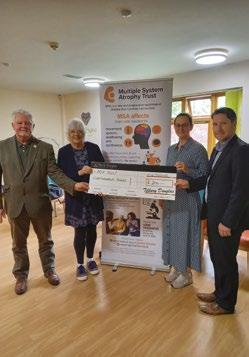
If you work at or own a business and would like to nominate the Trust for similar support, please get in touch with us at fundraising@msatrust.org.uk. We will help you maximise the opportunity by providing collection and publicity materials and can write to your employer explaining MSA and the work of the Trust. msa news
Research Information Groups
Weknow that MSA Research is important to our members. Over the period of our existence the Trust has spent over £3,250,000 funding research projects and two Clinical Research Fellowships, furthering our understanding of the cause and treatment of MSA.
We also know that for people with MSA and their families the pace of research can seem slow and it can be hard to stay up to date. To make sure our members feel as informed as possible, in the Autumn we hope to launch the first of our Research Update Sessions on Zoom. Our former research fellow, Dr. Viorica Chelban, will provide updates on current studies, answer
member’s questions about research and discuss how members can input into the research process.
“Involving patients and their families in all stages of research is recognised as being essential to the clinical research process. The MSA community have so much invaluable experience to contribute and we look forward to the chance to engage with our members about research via this group.” Emma Saunders, MSA Nurse Specialist
If you would like to be informed of these groups when they launch, please let us know at support@msatrust.org.uk msa news
FUNDRAISING WORKPLACE FUNDRAISING
www.msatrust.org.uk | 19
You can now purchase a wide range of items to support our work. Our new shop offers a variety of products including wristbands, t-shirts, cycling jerseys, wedding favours, pens and other branded accessories.
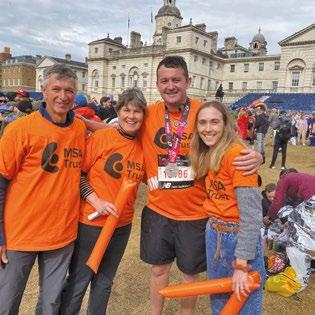

All our merchandise is specifically designed to help raise awareness of MSA and fund our work supporting the MSA community.
So why not take a few minutes to browse our new online shop today?


Whether you’re looking for a stylish new T-shirt or a practical accessory, you are sure to find something that catches your eye. With every purchase you make, you’ll be helping to support vital Trust work. Buy online at www.shop.msatrust.org.uk to place an order or email
information.
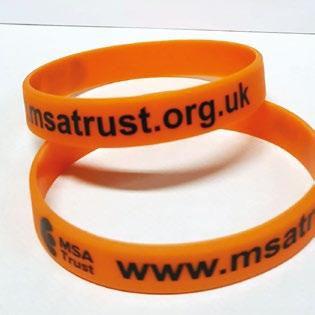
are thrilled to
the launch of our new online shop!
www.facebook.com/MSATrust1 We
announce
for more
Cycling Jersey Tea Party Mug MSAT T-shirt Wristband £22 £8 £8 £1 Follow us on social media www.twitter.com/MSAtrust www.instagram.com/msatrust
fundraising@msatrust.org.uk


































